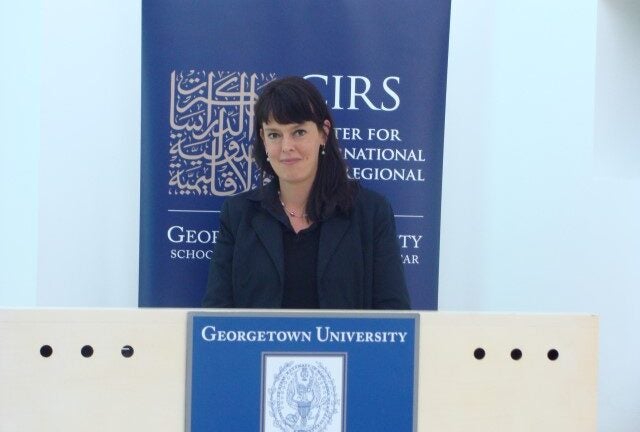Dialogue Series, Race & Society, Regional Studies
Katja Niethammer on Political Reform and Confessional Identities in Bahrain

On January 18, 2009, CIRS began the 2008-2009 spring semester with a Monthly Dialogue lecture entitled “Democrats and Autocrats, Shi’ites and Sunnis: Political Reform and Confessional Identities in Bahrain” given by its Postdoctoral Fellow Katja Niethammer.
Niethammer’s lecture is part of a larger study undertaken in her PhD research and analyzes the differences in goals, strategies and behavior between Shi’ite and Sunni Islamist political organizations in Bahrain. As such, she “shed light on the relationship between Islamist actors and political reform.” Niethammer conducted extensive fieldwork in Bahrain, during which time she conducted interviews with political and religious activists from both Shi’ite and Sunni communities and also spent time within the Bahraini parliament. During these visits, she witnessed parliamentarians “engage in serious confessionalist agitation and occasionally scuffles between MPs erupted sparked by discussions on events in Iraq.”
The study of Islamist groups in general is extremely important in the current political climate of the Gulf states as “Islamist groups are currently – and not only in Bahrain – the most important actors besides the ruling elites.” This is because “they have a wide social base and have extensive religious networks at their disposal.” Niethammer noted that the groups portrayed in her research are legal organizations and promote their goals through non-violent means.
During her lecture, Niethammer proceeded to debunk the two major assumptions currently holding sway over Islamic studies scholarship. The first assumption is that Islamist parties form a natural partnership with ideas of reform and justice and the second revolves around the hypothesis that Islamist parties will lose any extremist edge and become more democratic if involved in serious parliamentary participation.
These assumptions have been proven valid in some Middle Eastern countries, but Niethammer proposed that the situation in Bahrain was far more complex. Because those parties that rejected electoral participation – the Shi’ite Islamist parties – called out for more democratic reform, and those that fully contributed to parliamentary elections – the Sunni Islamist parties – were more concerned about supporting authoritarian rule, other factors must be useful in explaining moderation and reform-mindedness.
Niethammer proposes that one reason why Bahrain does not fit comfortably within the frame-work of these hypotheses is Bahrain’s prevalent sectarian and ethnic fragmentation, which has created dominant and marginalized groups. Hence, the social and economic positions of the Islamists vis-à-vis the ruling elite determine their political goals and strategies to a larger extent than their ideological orientation. She suggests that this might also be the case in other fragmented societies in the Middle East.
In conclusion, Niethammer argued that such experiences from Bahrain suggest that “when Islamists represent a dominant confessional group, they reject meaningful reforms that enhance political representation and participation. When Islamists represent politically marginalized groups, they endorse such reforms.” In other words, Niethammer maintained that Islamist political actors do not exhibit any behavior that is different from their secular counterparts.
Niethammer joined CIRS for the 2008-2009 academic year. During her Fellowship spent within the framework of CIRS’ research and scholarship initiatives, she has been involved in three major projects.
Article by Suzi Mirgani, CIRS Publications Coordinator